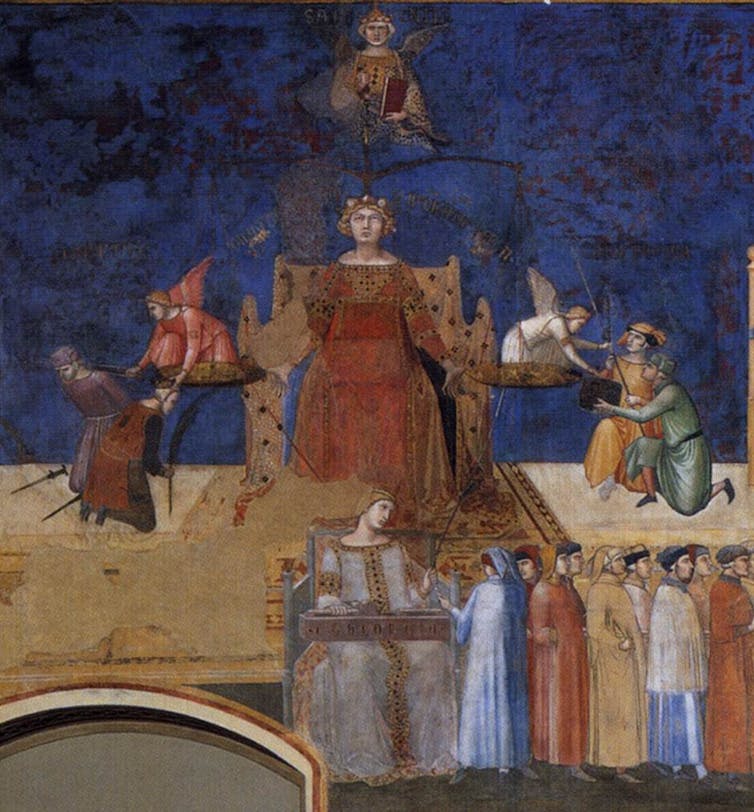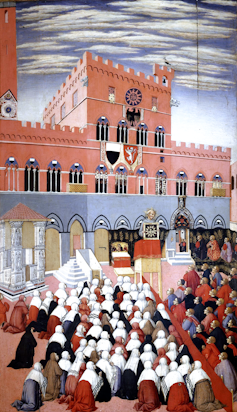How pandemic shattered the harmony of medieval Europe’s diverse cities

My book Cities of Strangers: Making Lives in Medieval Europe is about the ways newcomers were received and accepted in medieval cities: how strangers became neighbours, and how calamity made them strangers again. Published amid the coronavirus pandemic and the changes it has brought to urban life, the subject has taken on a new poignancy.
The twelfth and thirteenth centuries were a period of economic and demographic growth. My research has shown that urban communities and rulers followed a policy of careful inclusion, bringing strangers into cities.
Diverse cities
A number of European cities, like Siena and Venice in Italy, were effectively self-governing. Some of these cities allowed workers and traders from the countryside to join the urban community, as long as they settled with their families, built a house and in due course paid their taxes. After a period of settlement, some might even become full citizens – an option open to Christian men. Cities also invited useful strangers to settle: physicians, bankers, notaries, legal experts, workers with technical expertise.
Read more: Coronavirus: advice from the Middle Ages for how to cope with self-isolation
In some dynastic kingdoms, like Hungary and England, Poland and Castile, rulers controlled the movement of people and favoured groups. They might take an approach which promoted economic growth, inviting in groups of merchants and financiers – like Flemings in England, and Jews and Lombards in Hungary.
And so medieval cities and towns became truly diverse. A constant flow of newcomers offered labour in workshops and in service. Notable groups of strangers – by religion, by language – were also a constant presence. Communities of Jews and Lombards were found across Europe; and in the cities of Iberia, Jews, Christians and Muslims lived in substantial numbers side by side.
It would be wrong to think that these arrangements meant that social peace prevailed in medieval cities. It never does. Competition, suspicion, and prejudice existed, but newcomers and other “outsiders” were protected by a legal framework that allowed and enabled their presence.

Medieval theories of government were based on the idea of the common good, which prioritised the wellbeing of the community as seen by its governing elite. But economic opportunity underpinned the confidence with which dynastic rulers and town councils invited new members into their cities. It is not surprising, then, that when the tide turned, this tentative social cohesion was affected too.
First, a run of terrible famines between 1314 and 1322 affected northern Europe. A generation later, a pandemic that had begun its slow spread through Asia a century earlier, reached Europe.
Medieval Europe was not as globalised as our world is, but there were substantial routes of trade, travel, mission and conquest which linked Asia, Africa and Europe. Along these routes – by land, and on its final leg by sea, on ships – the plague arrived in Europe. Its first wave, from 1347 to 1351, killed between a third and a half of the population. Stop and think what this meant: grief and trauma, abandoned harvests, voided cities, fractured families.
Division and discord
We should assess the impact of such mortality in the short term and the long. The immediate calamity saw utter dislocation: food prices soared, people lost their loved ones, clergy died in large numbers. Those who could, escaped to safer spaces, but most could not. Workers were in high demand to maintain the production of food and goods, and so their wages rocketed, despite the emergency legislation introduced by most rulers to fix pay at pre-plague levels.
In hundreds of towns - first in southern France and Iberia in 1348, then in the Holy Roman Empire in 1349 – rumours spread that Jews had caused the mortality by poisoning water supplies. Jews were killed in the thousands. Pope Clement VI repeatedly attempted to stop the killings, by pointing out in widely circulated letters that Jews were also dying of the plague.

The language of division, separation and exclusion entered a space once filled by ideas of a common good. Its most effective carriers were preachers, often Franciscan friars. Jews, heretics, suspect women, newcomers, the poor, were subject to discipline, punishment and sometimes death.
In many cities, buildings stood empty and prospects remained bleak for a century and more. Division and suspicion were spread by professional moralisers, whose toxic message had been kept somewhat at bay in better times.
If there is a lesson to be learned, it is this: the aftermath of calamity is dangerous too. We must all be vigilant; a sickness of the body can also poison the mind of the body politic.
Miri Rubin, Professor of Medieval and Early Modern History, Queen Mary University of London
This article is republished from The Conversation under a Creative Commons license. Read the original article.



